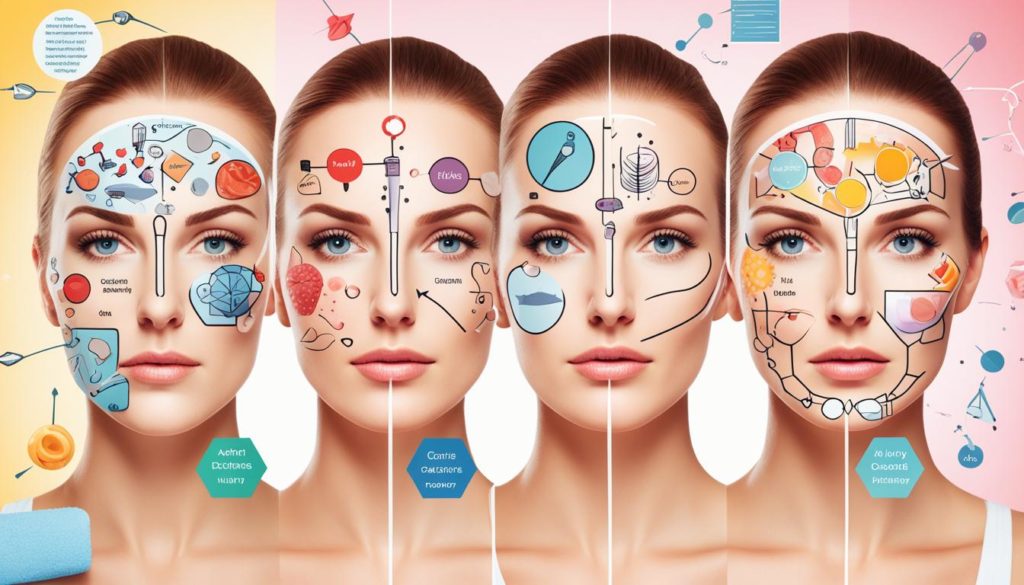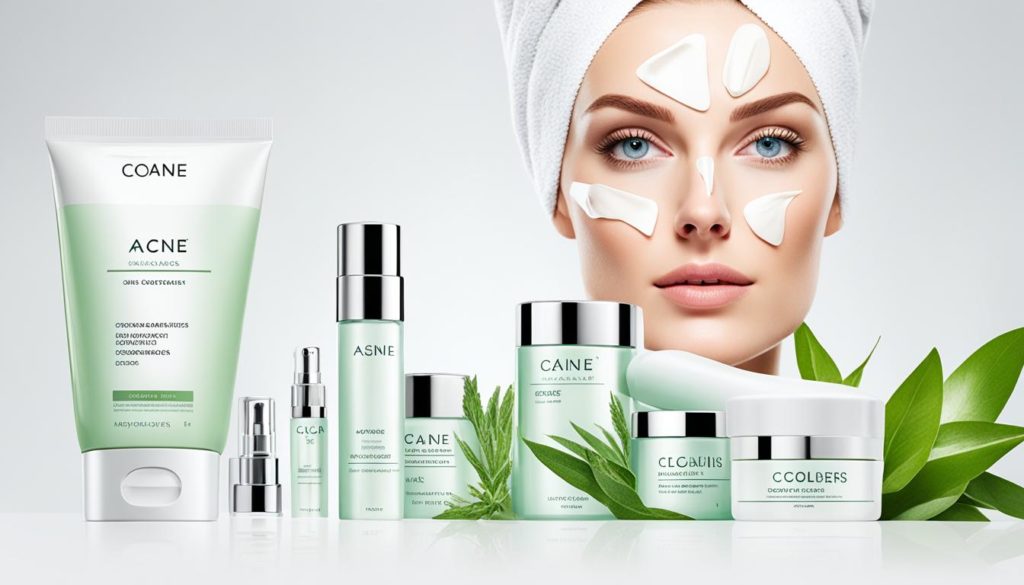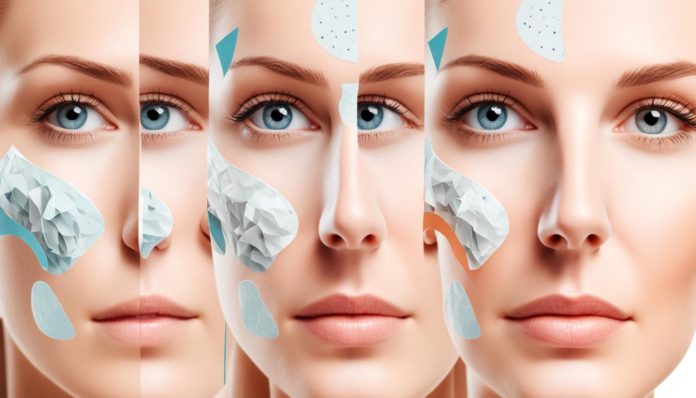Did you know that more than 50 million Americans deal with acne yearly? This makes acne the top skin issue in the United States. Given this, it’s crucial to have a good skin care plan to fight acne. We’ll look at dermatologist-recommended advice for tackling acne. You’ll learn how to pick the right treatment for your skin.
An effective acne plan isn’t just about creams or lotions. It’s about the whole picture, including the right products, changes in your lifestyle, and expert advice. Following advice from skin doctors can really make your skin care routine better. This helps you get and keep clear skin.
Key Takeaways
- Over 50 million Americans suffer from acne each year, highlighting its prevalence and impact.
- Dermatologist-approved acne care involves more than just products; it includes lifestyle changes and professional advice.
- A holistic approach to acne treatment is essential for achieving long-term clear skin results.
- Integrating expert tips into your skincare routine can enhance its effectiveness.
- Effective acne care requires understanding your skin type and choosing the best acne treatments accordingly.
Understanding the Causes of Acne
Acne is a common concern that affects the skin. It’s influenced by multiple factors. Understanding these causes helps in managing acne better. Learning about hormonal imbalances, diet, and genetics is key to optimal acne care.

Hormonal Imbalances
Hormonal imbalances are a top cause of acne. This type of acne shows up during puberty, menstruation, pregnancy, and high stress times. Hormones like androgens make sebaceous glands bigger and more active. This leads to more sebum and clogged pores.
Diet and Nutrition Factors
Your diet plays a big role in your skin’s health. Research shows how diet affects skin health, and some foods make acne worse. Eating lots of sugar and refined carbs can raise insulin levels. This triggers hormonal changes that lead to acne. Eating plenty of fruits, veggies, and omega-3 fatty acids helps get clearer skin.
Genetics and Skin Type
Genetics determine your skin type and how likely you are to get acne. If your parents had acne, you might too. Genetic factors affect oil production, cell turnover, and inflammation in the skin. All of these contribute to acne.
- Hormonal Imbalances: Key drivers of skincare for acne due to changes in hormonal levels.
- Diet and Nutrition: Understanding dietary impacts on skin health for better acne management.
- Genetics: Recognizing the genetic predisposition towards acne to tailor skincare routines effectively.
Effective Acne Products to Consider
Choosing the right acne products is crucial. You need cleansers, exfoliants, treatments, and moisturizers for the best results. Here are some top picks to help you fight acne effectively.
Cleansers and Exfoliants
A good cleanser starts your acne care. Find products with salicylic acid or benzoyl peroxide. These ingredients help reduce acne. Also, use gentle exfoliants to remove dead skin and unclog pores. Choose products that are kind to your skin.

| Product | Key Ingredient | Benefit |
|---|---|---|
| Cetaphil Daily Facial Cleanser | Glycerin | Gentle on skin, removes dirt and oil |
| Neutrogena Oil-Free Acne Wash | Salicylic Acid | Reduces acne, prevents new breakouts |
| Paul’s Choice Skin Perfecting 2% BHA Liquid | Salicylic Acid | Exfoliates, clears pores |
Topical Treatments and Serums
Spot-treating blemishes is key with topical treatments. Look for products with retinoids to reduce inflammation and improve your skin. Serums with niacinamide are also great for controlling oil and minimizing pores.
Moisturizers and Sunscreens
Keeping your skin hydrated and safe from the sun is vital. Use lightweight moisturizers with ingredients like hyaluronic acid. Choose sunscreens for acne-prone skin to avoid dark spots and irritation. These steps are important for ongoing skin care and health.
Consulting with a Dermatologist
If you’re facing tough, lasting acne, dermatologist-approved acne care can really change things. A dermatologist checks your skin closely. They find out what’s really causing your acne and pick the right science-backed treatments.
Seeing a dermatologist means you get a skincare plan just for you. It’s not like the guesswork with store-bought products. They can set you up with special meds, creams, or even treatments like peels or lasers, aimed right at your skin’s needs.
A dermatologist also keeps tabs on how well your treatment is working. They can tweak your personalized skincare for acne plan as your skin or life changes. This keeps your skin care right on track.
To show some typical treatments dermatologists might suggest, here’s a table of options:
| Treatment | Purpose | Advantages |
|---|---|---|
| Prescription Medications | Reduce inflammation and bacterial growth | Targets severe cases effectively |
| Chemical Peels | Exfoliate and rejuvenate skin | Improves skin texture |
| Laser Therapy | Remove acne scars | Minimal downtime |
| Customized Topical Treatments | Address specific acne types | Reduced side effects |
Natural Acne Remedies
Looking into natural acne solutions is a big step toward getting clearer, healthier skin. We will check out various plant-based treatments, essential oils, and changes in diet. These can help control and lessen acne.
Herbal Treatments
Using plants for acne taps into nature’s power to fight off breakouts and calm inflammation. Take tea tree oil, known for fighting germs and swelling. Aloe vera is also great. It cools down irritated skin and cuts down on redness. Adding these to what you do for your skin can make a big difference gently.
Essential Oils and Their Benefits
Essential oils aim for a skin that’s free of blemishes by using their strong qualities. Lavender oil helps soothe the skin and make acne scars fade. Rosemary oil is a good pick too. It stops the germs that cause acne from growing. Using these oils can greatly better the look of your skin.
Dietary Changes for Clearer Skin
Making changes to what you eat is key in dealing with acne. Eating plenty of fruits and vegetables gives your skin the nutrients it needs. Cutting back on processed foods and sugars helps avoid acne outbreaks. Foods high in omega-3 fatty acids, like fish and flaxseeds, lower inflammation. Meanwhile, zinc-rich foods such as spinach and nuts make your skin clearer.
| Natural Remedy | Benefit |
|---|---|
| Tea Tree Oil | Antibacterial and anti-inflammatory |
| Aloe Vera | Soothes irritated skin, reduces redness |
| Lavender Oil | Calms skin, reduces acne scars |
| Rosemary Oil | Antimicrobial, prevents acne |
| Omega-3 Fatty Acids | Reduces inflammation |
| Zinc-Rich Foods | Enhances skin clarity |
Developing a Personalized Acne Care Routine
A personalized acne care routine can change the game in fighting breakouts. It means designing a plan that meets your skin’s unique needs. This approach boosts skin health and appearance.
To create an effective acne treatment routine, adapt it as your skin changes.
Morning and Evening Skincare Rituals
Start your day right with a gentle cleanser made for your skin type. Then, use a toner to balance the pH levels of your skin. Don’t forget a lightweight moisturizer with SPF to protect against the sun.
At night, first remove makeup and dirt with a deep-cleansing face wash. Follow that with an acne-fighting serum or treatment. Finish with another layer of moisturizer to hydrate your skin while you sleep.
Adjusting Your Routine Over Time
Your skin’s needs can change with the seasons, stress, or diet. Pay attention to how your skin responds to different products. You might need to switch things up, like using a more hydrating moisturizer in winter.
Or maybe a stronger cleanser when it’s more humid out. Be ready to adjust your routine as needed.
Tracking Your Skin’s Progress
Keeping a skincare journal helps you notice any product reactions or changes. Also, take photos over time to see your progress. This can show what’s working and what might be causing breakouts.
Regularly check your routine and make updates for better acne prevention. This leads to more insights and effective adjustments.
Acne Prevention Tips
To keep your skin clear and healthy, adopting effective acne prevention tips is key. Adding these practices to your daily skincare can make your skin better. This also boosts your confidence.
Regular Cleansing: Clean your face twice a day to get rid of dirt, oil, and unwanted particles. It’s best to use a mild cleanser that’s right for your skin type. Using strong products might irritate your skin and make acne worse.
Avoiding Skin Irritants: Items like fragrances, alcohol-based products, and rough exfoliants can upset your skin. Pick skincare items that are non-comedogenic and hypoallergenic. This prevents blocked pores and redness.
Maintaining a Clean Environment: Make sure things that touch your face, like pillowcases, towels, and phones, are always clean. Washing them regularly can lower the risk of bacteria spreading. This may help prevent acne.
- Diet: Eating fruits, vegetables, whole grains, and lean proteins is important. Try to eat less sugary and fatty foods. These can make acne worse.
- Hydration: Drinking lots of water keeps your skin moist and healthy.
- Stress Management: Too much stress can lead to hormonal changes which might cause acne. Try yoga, meditation, or working out to lower stress.
By following these acne prevention tips carefully, you can build a skincare routine that suits your skin. This helps reduce breakouts and keep your skin clear.
Acne Care for Different Skin Types
Personalized skincare for acne helps get clear, glowing skin. Knowing your skin type lets you create an effective routine. Different skin types, like oily, dry, and combination, need tailored care and treatments.
Oily Skin
For oily skin, it’s vital to control oil and prevent clogged pores. Use products that won’t clog pores and work to cut down oil. Ingredients like salicylic acid, niacinamide, and clay masks are great for this.
Keep up with a regular routine. Start with a gentle cleanser, then apply an astringent toner. Finish with a lightweight, oil-free moisturizer. Exfoliating regularly removes dead skin cells, helping to avoid blocked pores.
Dry Skin
Acne care for dry skin balances fighting blemishes and hydrating. Pick treatments that cleanse gently and moisturize deeply. Use hydrating ingredients like hyaluronic acid, glycerin, and ceramides to restore the skin and retain moisture.
Start with a mild cleanser that won’t dry out your skin. Follow that with a nourishing serum and a rich moisturizer. Avoid harsh scrubs and drying agents like benzoyl peroxide. These can make dryness and irritation worse.
Combination Skin
Caring for combination skin means treating both oily and dry areas. This needs a mix of strategies for oily and dry skin. Your skincare routine should have gentle products. They should reduce oil in the T-zone and hydrate dry patches.
| Skin Type | Key Ingredients | Product Recommendations |
|---|---|---|
| Oily | Salicylic Acid, Niacinamide | Gel Cleansers, Clay Masks |
| Dry | Hyaluronic Acid, Ceramides | Hydrating Cleansers, Rich Moisturizers |
| Combination | Balancing Formulas | Lightweight Moisturizers, Targeted Treatments |
Understanding your skin’s specific needs allows you to craft a skincare plan for acne. Whether it’s for oily or dry skin, choosing suitable products and following a regular routine can significantly impact. They lead to clear, healthy skin.
What to Avoid in Your Acne Treatment Regimen
To get clear skin, knowing what not to use is key. Your acne treatment plan needs the right products and methods. Avoiding certain things can majorly boost your chances for success.
Common Mistakes
Going overboard with exfoliation is a big no-no. It can take away your skin’s natural oils and cause more problems. This overdoing can irritate your skin and lead to even more acne. On top of that, using products that clog your pores will not help.
Something else to watch out for is touching your face too much. Your hands carry oil and germs that can mess with your skin. Keeping your hands away from your face is a simple but effective tip.
Harmful Ingredients
Some skincare ingredients are bad news for acne-prone skin. For instance, alcohol in products can dry out and irritate your skin. Also, dyes and fragrances in skincare can cause allergies and make acne worse. Check out this guide on acne care for more tips.
Clear Skin Solutions for Persistent Acne
Dealing with stubborn acne is tough, but there’s hope. There are clear skin solutions to help you get rid of acne. Let’s explore advanced treatments and how to manage acne scars. Our goal is to help you get clear, glowing skin.
Advanced Treatments
There are strong treatments like laser therapy and chemical peels for tough acne. Laser therapy uses light to kill acne bacteria and help heal your skin. Chemical peels peel off the top skin layer with a chemical solution. This reveals clearer, smoother skin.
“Both laser therapy and chemical peels require professionals for safe and effective use. Talk to your dermatologist about the best option for your skin and acne.” — American Academy of Dermatology (AAD)
Acne Scar Management
Treatments for acne scars are key for those who’ve had acne. Microneedling and dermal fillers can make scars less noticeable. Microneedling encourages collagen to heal the skin, while fillers even out the surface.
Other options include creams with retinoids and AHAs. These help with skin renewal and reducing scars. Adding these treatments to your care routine can lead to better skin.
| Advanced Treatment | Benefits | Considerations |
|---|---|---|
| Laser Therapy | Reduces acne-causing bacteria and promotes skin healing | Requires multiple sessions |
| Chemical Peels | Exfoliates and reveals clearer skin | Can cause temporary redness and peeling |
| Microneedling | Stimulates collagen production, reduces scars | May require downtime for healing |
| Dermal Fillers | Fills in depressed scars for a smoother surface | Temporary results, need periodic treatments |
Conclusion
Expert acne control needs a well-rounded plan. This includes knowing the root causes like hormone imbalances, food habits, and genetics. Finding the right products is key.
Dermatologist-backed steps help a lot. This means using the right cleansers, creams, and sunblock daily. For natural remedy fans, herbs, essential oils, and diet changes are good options.
Beating acne takes time, steady effort, and maybe expert advice. Stick to a skin care plan made just for you. Change it as your skin changes. With a full view of skincare, clear and healthy skin is yours to have.
FAQ
What are the best treatments for acne according to dermatologists?
Top treatments for acne include creams like benzoyl peroxide and retinoids. Dermatologists may also prescribe pills for tougher cases. They always suggest a treatment plan that fits you best.
How can diet affect acne?
What you eat can impact your skin. High sugar foods, dairy, and unhealthy fats might make acne worse. Eating fruits, veggies, whole grains, and lean proteins can help your skin look better.
Are natural acne remedies effective?
Some people find tea tree oil, aloe vera, and diet changes helpful for acne. Results can vary. Always talk to a dermatologist before trying new natural treatments.
What should I include in my daily skincare routine to prevent acne?
For preventing acne, use a gentle cleanser and an exfoliant daily. Add a acne-fighting product, a moisturizer that won’t clog pores, and sunscreen. Consistency and watching how your skin reacts are important.
How do hormonal imbalances contribute to acne?
Hormones can cause more oil on your skin. This leads to acne. Reducing stress and getting the right treatments for hormone issues can help.
What should I avoid in my acne treatment regimen?
Don’t scrub too hard or pop pimples. Avoid products that clog pores. Stay away from skin irritants like alcohol and synthetic fragrances. Use recommended treatments and safe products.
Are there advanced treatments for persistent acne?
Advanced options like laser therapy and chemical peels help with hard-to-treat acne. These should be done by experts. They often work best with other acne care methods.
Can certain skincare products cause acne?
Yes, products with pore-clogging ingredients can cause breakouts. Pick non-comedogenic skincare suited for acne-prone skin to avoid this.
How can I manage acne scars?
Treatments for acne scars include microneedling and laser therapy. Use sunscreen to keep scars from getting darker. A dermatologist can create a treatment plan just for you.
What lifestyle changes can help prevent acne?
Keeping your skin clean, not touching your face, and washing fabrics often can help. Managing stress and drinking water are good too. Healthy eating and consistent skin care are key for clear skin.
How should I adjust my skincare routine over time?
Change your skincare routine as your skin changes. Check your skin’s condition regularly. You might need more moisture or a different acne product. Keep track of how your skin responds to guide adjustments.


